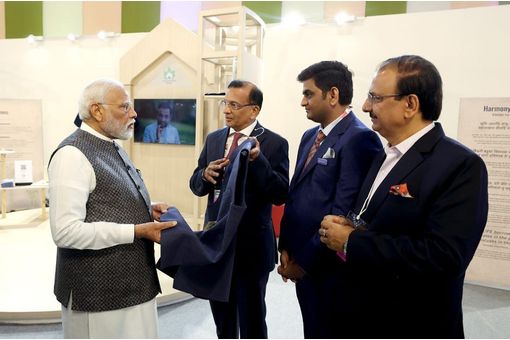Interviews
Parliament & Council: deal on textile labelling: fur must be mentioned
23 Apr '11
3 min read
Parliament and Council negotiators reached a compromise deal on a new EU regulation on textile labelling. Parliament ensured that any use of animal-derived materials will be stated on garment labels. The Council also agreed to ask the Commission to do an assessment report, by 2013, on a possible origin labelling scheme. This report may be accompanied by a legislative proposal.
"With this agreement we take a big step towards completing the internal market for textile products, with clear advantages for consumers, the industry and Member States. I am proud of what we achieved. I think Parliament has shown a clear vision on consumer issues", said Parliament's rapporteur Toine Manders (ALDE, NL), after the second-reading deal between Parliament's negotiating team and the Council presidency. The agreement will be put to the approval of the full house during the May plenary in Strasbourg.
Although the proposal was originally purely technical, aiming to simplify existing textile labelling rules and allow faster introduction of new fibres and innovative products to the market, Parliament won important political concessions in the negotiations.
Fur and leather
Consumers will no longer risk inadvertently purchasing real fur or leather products when they would prefer not to do so. Allergy sufferers would also benefit, because fur can pose a potential health hazard to them. The Commission is also asked to carry out a study, by 30 September 2013, on whether there is a causal link between allergic reactions and chemical substances (e.g. colourings, biocides, or nanoparticles), used in textile products.
Parliament has ensured that textiles containing such products must be labelled "non-textile parts of animal origin", to enable consumers to identify such products.
"Made in" labels
To enable consumers to check the origin of textile products manufactured outside the EU, Parliament had proposed that "made in" labels be made mandatory for them. The Council has agreed to have the Commission look further into this issue.
The Commission is asked to present a study, by 30 September 2013, on the feasibility of an origin labelling scheme to give consumers "accurate information on the country of origin and additional information ensuring the full traceability of the textile product". This assessment report may be accompanied by a legislative proposal.
The Council also agreed to a political statement underlining the importance of providing accurate information to consumers, in particular in relation to country of origin, "so as to protect them against fraudulent, inaccurate or misleading claims".
Exemption for self-employed tailors
The agreement also provides for an exemption from mandatory labelling requirements for customised textile products made up by self-employed tailors.
"With this agreement we take a big step towards completing the internal market for textile products, with clear advantages for consumers, the industry and Member States. I am proud of what we achieved. I think Parliament has shown a clear vision on consumer issues", said Parliament's rapporteur Toine Manders (ALDE, NL), after the second-reading deal between Parliament's negotiating team and the Council presidency. The agreement will be put to the approval of the full house during the May plenary in Strasbourg.
Although the proposal was originally purely technical, aiming to simplify existing textile labelling rules and allow faster introduction of new fibres and innovative products to the market, Parliament won important political concessions in the negotiations.
Fur and leather
Consumers will no longer risk inadvertently purchasing real fur or leather products when they would prefer not to do so. Allergy sufferers would also benefit, because fur can pose a potential health hazard to them. The Commission is also asked to carry out a study, by 30 September 2013, on whether there is a causal link between allergic reactions and chemical substances (e.g. colourings, biocides, or nanoparticles), used in textile products.
Parliament has ensured that textiles containing such products must be labelled "non-textile parts of animal origin", to enable consumers to identify such products.
"Made in" labels
To enable consumers to check the origin of textile products manufactured outside the EU, Parliament had proposed that "made in" labels be made mandatory for them. The Council has agreed to have the Commission look further into this issue.
The Commission is asked to present a study, by 30 September 2013, on the feasibility of an origin labelling scheme to give consumers "accurate information on the country of origin and additional information ensuring the full traceability of the textile product". This assessment report may be accompanied by a legislative proposal.
The Council also agreed to a political statement underlining the importance of providing accurate information to consumers, in particular in relation to country of origin, "so as to protect them against fraudulent, inaccurate or misleading claims".
Exemption for self-employed tailors
The agreement also provides for an exemption from mandatory labelling requirements for customised textile products made up by self-employed tailors.
Popular News
Leave your Comments
Editor’s Pick
Ritesh Dodhia
Dodhia Synthetics Limited
Navin Sharma
Yash Textile Machines Private Limited
Daniela Brunner
Label - Guilia & Romeo
Dr. Sameer Sood
National Institute of Fashion Technology
































-Ltd..jpg?tr=w-120,h-60,c-at_max,cm-pad_resize,bg-ffffff)





.jpg?tr=w-120,h-60,c-at_max,cm-pad_resize,bg-ffffff)
.jpg?tr=w-120,h-60,c-at_max,cm-pad_resize,bg-ffffff)






